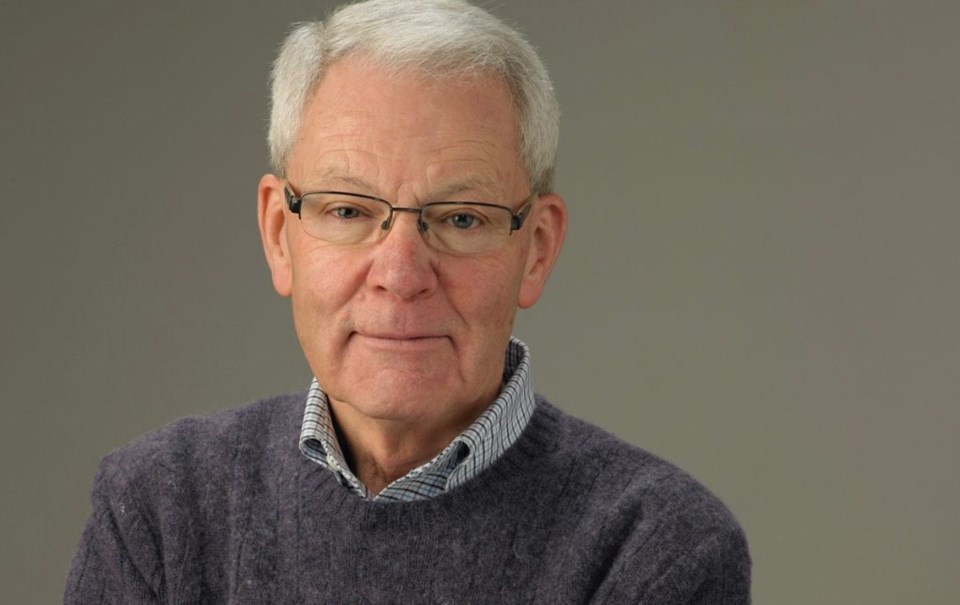
After a distinguished career in academia, and with a list of scholarly and authoritative tomes on Canadian politics, the constitution and federalism to his credit, David Smith says he might just have written his last book. An imortant one.
His most recent, co-authored with two other experts on Canada’s constitution and the role of the monarchy, has just recently been released, and is being positively reviewed.
Canada’s Deep Crown, Smith says, explains how a constitutional monarchy functions, and how it has shaped, and continues to shape Canada’s system of government.
Its role in our history, and in our government today, is not something that is widely understood by Canadians, he says.
Despite having worked with co-authors Christopher McCreery, the private secretary to the Lieutenant Governor of Nova Scotia, and Jonathan Shanks, senior counsel at the Privy Council Office Legal Services Sector of the Department of Justice Canada, Smith says he doesn’t know either of them well.
He recalls a time about three years ago, when they met at a reception for Elizabeth Dowdeswell, lieutenant governor of Ontario, and after the event, had some time to talk. Their conversation was around the need for a book to be written about the Crown, “that goes beyond the power of the crown, and that takes a closer look at the effects of the power, which is really quite enormous. Most Canadians don’t really understand the extraordinary power of the Crown.”
Now 85, Smith says he can’t remember much talk about the Crown at all during his school days, “except that it did exist, and that we were a colony of Great Britain. People don’t think that way any more.”
He says when we talk about the Crown, it is typically about the pomp and circumstance — but more about the pomp, and little about the circumstance, yet “it’s remarkable how well the system works. Canadians need to be more appreciative of the success of the constitutional system in our country.”
Canada’s Deep Crown, Smith says, is important in that it will help Canadians have a better understanding of the constitutional system and its success.
He and the co-authors “thought it would be helpful to explain the breadth and depth of the powers of the Crown in Canada, as a symbol, but one that has a lot of influence. The tendency is to undervalue that.”
Smith was born in Nova Scotia, of British heritage, and has lived in different locations across the country, including B.C., Saskatchewan, and Ontario.
His wife was a judge in the court of appeal in Saskatchewan, while he was a professor at the university..
He has been called “one of the treasures of Canadian political science,” and is now a political studies professor emeritus of the University of Saskatchewan, where he taught political science from 1964 to 2004, and is a previous president of the Canadian Political Science Association. He is also an adjunct faculty member in the department of politics and public administration and a member of the Yeates School of Graduate Studies at Ryerson University.
He and his wife are enjoying retirement years in Niagara-on-the-Lake, family both close by and scattered across Canada.
Their move to NOTL came after a visit to friends in Queenston. “My wife was quite attracted to the area,” he says, and about seven years ago, they moved to Garrison Village.
Over the course of his career, “I’ve pretty much always been writing a book, but I may have come to the end of that. I’m not sure I’m up to writing another,” he says, citing health issues that sap his energy.
He recently gave up driving, so the days of travelling to Toronto to continue his association with Ryerson University have decreased. A trip to the city, where he has done most of his research pre-pandemic, has become taxing, taking about two hours each way. As much as he and his wife love NOTL, that was one aspect of moving he didn’t consider, he says.
While they both enjoy the restaurants, the wineries, and the Shaw Festival, “what we most love is the countryside around Niagara-on-the-Lake. It’s very pretty, and very relaxing. We love the peaceful rural areas. I just wish there was more convenient public transportation to get to the city.”
Those trips have been put on hold during COVID, as have most of his activities, including a men’s book club.
He finds it frustrating that he’s lost contact, temporarily at least, with Ryerson, but “not nearly as frustrating, I’m sure, as it must be for students or other younger faculty.”
Canada’s Deep Crown is published by University of Toronto Press, which says about the book, “The Crown in Canada has had a profound influence in shaping a country and a constitution that embraces the promotion of political moderation, societal accommodation, adaptable constitutional structures, and pluralistic governing practices. While none of these features themselves originated through legislative or constitutional action, David E. Smith, Christopher McCreery, and Jonathan Shanks propose that all reflect the presence and actions of the Crown.”
It is available from Amazon, at Indigo Books, and where academic books are sold, says Smith.
Reviews that have been published recently call it “an excellent book that should be read by anyone interested in the monarchy in Canada. It is the most comprehensive and authoritative source available on the subject, offering a wide-ranging and in-depth analysis of the crucial role played by the Crown in Canada.” (Andrew Heard, Professor of Political Science, Simon Fraser University)
Serge Joyal, former member of the Senate of Canada, says on the eve of the Queen’s jubilee, the publication of a book by three knowledgeable authors underscores the exceptional character of her long reign. In exploring three core themes — myth, law, and personality — the authors explain how the Crown retains its enduring importance in our constitutional order. Readers will learn the ways by which the Crown continues to serve and remains relevant in contemporary Canada.”


